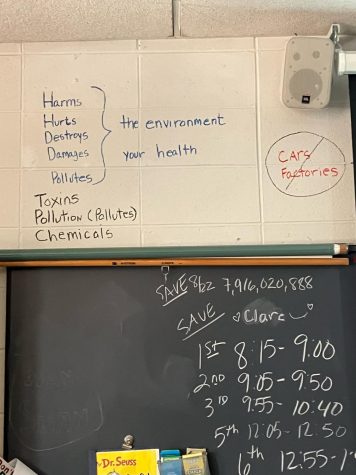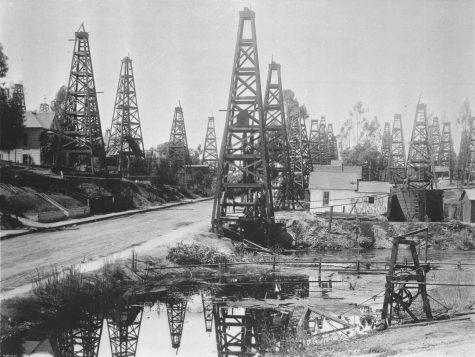Environmental Science Classes Shouldn’t Teach Students to Kick the Ladder Down
Environmental Science Curricula Should Consider The Effects of Climate Regulation on Developing Countries
Environmental Science classes often teach students that there is no redeeming value to fossil fuels. Yet that perspective, and the policy it inspires, may harm developing countries.
May 2, 2023
I recently watched a fascinating interview between John Stossel (far and away one of my favorite journalists) and Alex Epstein, author of a book called The Moral Case for Fossil Fuels. In the interview, Epstein makes a case for the continued use of fossil fuels in developing countries as a way to increase their quality (and longevity) of life. Stossel, often a contrarian, questions Epstein, almost seeming to take on the role of an environmentalist, despite ultimately being receptive to his argument.
The interview had me thinking about the Enviro-Honors class I take and the lessons taught in that class. Rarely had the role of fossil fuels in developing a nation’s economy been brought up. To her credit, Mrs. Nawor, the Enviro-Honors teacher, correctly identified the nature of environmentalism: “[It’s] a luxury,” she said.
But actions speak louder than words, and the policies presented favorably by the class failed to reflect that crucial reality. The evils of fossil fuels and the companies that sell them were dogmatically repeated. In one of the Enviro rooms, writing on the wall spells out the words “Cars,” and “Factories,” encompassed by a large “no” symbol.

Have we so soon forgotten how cars, factories, and fossil fuels built the United States as we know it? It was fossil fuel that industrialized America in the late 19th century and turbocharged innovation in all walks of life. The factories (especially ones manufacturing automobiles) won the Second World War and shot the US into the spot of a global economic superpower.
Similar stories are true of other nations, even historically underdeveloped and poor countries like Scotland in the late 18th century and Russia and China in the 20th. But the people who benefit daily from the historical use of fossil fuels, like us in the United States and, more generally, the West, want to kick down the fossil fuel-covered ladder to success for poor and developing countries.
This desire may be being instilled into LFHS students by environmental science classes, which teach that fossil fuels have little redeeming value.
Epstein’s perspective is logical and refreshing and ought to merit more consideration at all levels of the environmental debate. He doesn’t deny that climate change exists, nor that fossil fuel can cause harm. Simply, the agenda proposed by environmentalists would cripple the quality of life in developed countries and kill any hopes of reaching such a quality held by developing countries.
Epstein said in the interview that if people in developing countries want “their first well-paying jobs…their first consistent supply of clean water…a modern life…that’s going to depend on fossil fuels… The truth is, the planet is only livable because of low-cost, reliable energy from fossil fuels.”

How exactly does the environmental lobby in the US harm poor countries? Epstien has the answer for that too: “When you threaten an industry, you scare investors and producers. Massive threats to industry have definitely cut down production.” Production cuts that drive up the price of vital fossil fuels for developing countries.
The global environment lobby has red hands too, as when the UN pushes for “renewable energy,” poor countries concerned with those blue-helmet handouts listen. This pushes them away from reliable and affordable fossil fuels that could support industrialization, and eventually self-reliance, to unreliable and unaffordable “renewables” that could cement them into the lowest caste.
Epstein also believes that wealthy, developed countries, like the US, should move away from fossil fuels in favor of reliable and sustainable clean energy sources like nuclear fission to give developing countries room to industrialize.
Nuclear power, too, finds itself in the crosshairs of the environmentalist agenda, despite being a reliable and cost-effective sustainable energy source. Nuclear and hydropower are the backbone of clean energy in the US, but not every state or country has the geography necessary to facilitate hydropower. It’s little wonder why nuclear energy is the lifeblood of clean energy states like New Hampshire, Vermont, and South Carolina and countries like France.
Germany closed its last nuclear power plant after coming under pressure from environmental activists. To offset the energy deficit that the closing creates, coal power plants will be brought online, which will worsen climate change and air pollution. The activists allegedly sought to inspire a change to “renewable energy” like wind and solar, sources Epstein criticized as being intermittent, unfeasible, and expensive.
The closing is just another example of the wishful ignorance that is espoused by the environmental lobby. “The general narrative is we’re destroying the planet with fossil fuels, so who cares how much energy costs?” said Epstein. Instead of looking to the stars and hoping for futuristic technologies and interminable wealth, Epstein advocates we use what is within grasp to form a solution.
In my view, Alex Epstein’s vision is the best solution for climate change. No teenage activists faking being arrested for social media brownie points, no faceless bureaucratic agenda, and most importantly, no impact on quality of life or aspirations to such. His perspective might be described as “Sensible Environmentalism” or, to use a politically loaded term, “Conservative Environmentalism.”
It rejects the rapid transition to unreliable energy, unaffordable technologies, climate hysteria, and faux social media activism, preferring to take a slow, well-reasoned, and evidence-based approach to the climate problem. We can stop climate change only through reasoning free from emotional arguments.
Thus, environmental education and discussions surrounding topics like climate change and clean energy happening in the US, and at LFHS, must not serve as mouthpieces for plainly unfeasible climate solutions. If not to lift him up ourselves, we owe it to our fellow man to allow him to lift himself up, and environmental science curricula should reflect that by educating students on the redeeming values to fossil fuels.








mary beth nawor • May 4, 2023 at 12:24 pm
To be fair, the no factory, no cars sign is a reminder for my AP students that when they answer an FRQ they need to say something more specific like, “Combustion of fossil fuels” not just cars or factories. It was not an anti car or factory sign. I drive a car and I like stuff. Also, my point was that we, developed countries, have the luxury of a strong economy and access to new technology so we should be leading the way on a transition to renewable energy. Thanks for your article, Cole. I hope it spurs some good conversation!